'They are not affected by ISIS' sentiment of avenging the suffering of the global ummah.'
'They have a huge ummah of their own in India, a huge Muslim population.'
'And because of that, they have to take into consideration the political and social conditions of Muslims in India.'
'They have to express themselves in a more political way and not through terrorism.'
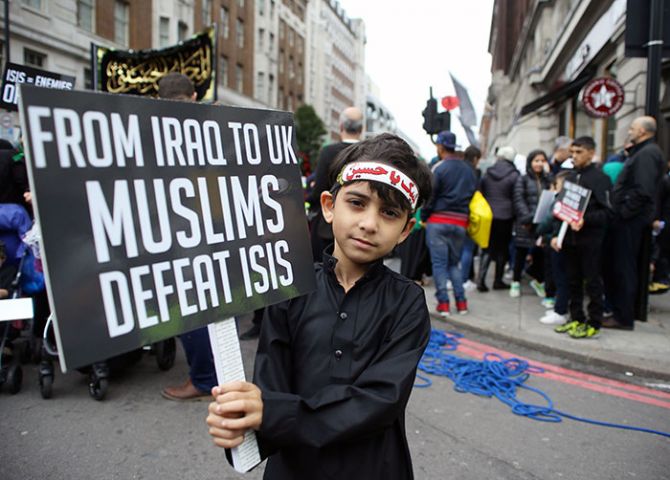
"The fact that al-Qaeda and Da'esh might disappear doesn't solve the issue of Muslim youth radicalisation," believes Dr Olivier Roy, one of the world's leading experts on political Islam.
Instead, homegrown terrorism might evolve, Dr Roy -- professor of social and political theory at the European University Institute, Florence, Italy -- tells Rediff.com's Vaihayasi Pande Daniel in the concluding part of an exclusive interview.
Part 1 of the Olivier Roy Interview: Why ISIS fascinates young Muslims
There is concern about Muslims being attacked in India for their beliefs, eating habits etc.
Could anger at this narrative bring about the rise of lone wolf attackers and such like? Or do you not think so?
It is possible.
But see, the big difference is the people in India -- the Muslims -- who have seen, at times, their neighbours suffering, who could become radicalised, have social connections with their Muslim community. (By definition) they cannot be (or are not) lone wolves...
Their (experience) of this suffering of the Muslim community, that they have in India is a real part of their life (unlike the lone wolves who committed terrorist attacks in the West).
But I think the (affected in India) might try to go the more organised and (find) politically minded means of defending themselves.
Of course, we may have lone wolves.
But we may have also people who try to create political parties or social movements, because they have social bridges, which is lacking in Western Europe.
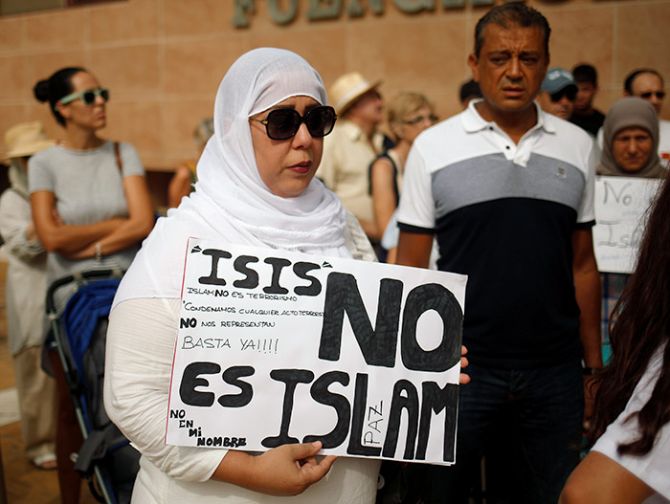
Let me return to the London/Manchester attacks earlier this year since they are so representative of youngsters getting affected by hate preachers.
Documentaries like The Jihadis Next Door or My Brother the Terrorist have shed light on extremist Islamic groups that have thrived in Britain and spread their tentacles elsewhere.
Have these people been given too much latitude and space in Britain to practice and preach their death cult or whatever violent extremism they are practicing?
Yes! That is the specialty of Great Britain!
We don't have (this case) in France. In France, a guy like Anjem Choudary (the now jailed hate preacher, who is UK-born but of Pakistani descent) would not have been allowed to speak out.
In Britain he would be allowed to speak/preach in the name of free speech. It is a particularly British exception.
In Germany, in Belgium, in Italy, he would have been jailed a long time before. Now in Britain the mood has changed.
There is now public opinion, and from the authorities, there is a new will to (ban) hate speech.
So it only happened because Britain believes so strongly in free speech?
There might have been a tradition (in Britain) of not really asking for integration and for (allowing) foreign immigrant communities (to remain) foreign.
There is this idea (that the attacks happened) because of (allowing) multiculturalism.
I am a bit doubtful, sceptical, about that.
If we look at those (British) terrorists now, the five guys who killed themselves or got killed in the three attacks (London in March; Manchester in May; London in June) recently, there is only one whose family is from Pakistan.
All the others -- the Moroccan, Italian-Moroccan, the Libyan and the convert from Jamaica -- (were from Europe).
So clearly these guys are not the expression of the mood of the traditional Muslim population.
And they were brainwashed?
I am sceptical about the concept of brainwashing.
I think these guys are, for different reasons, seeking attention.
They are not nice people, who slowly, under influence, become radical.
Many of these guys went to jail. They have a past of delinquency, of violence.
Many of them had a past of family violence, with their wives and so on.
I think these guys were rebels without a cause, who found a cause with ISIS.
So then it is absolutely no surprise that some of them didn't have to go to Syria or anywhere else to get radicalised.
They were radicalised right in the centre of London.
Ya, ya. Some of the jihadis would go to Syria. They are already radicalised when they go.
You don't have nice people going to Syria, just to do humanitarian work! No!
When they go to Syria, they go to fight. And many of them go to be killed.
They know they will die in Syria.
If we look, for instance, which is very fascinating, at the girls. Many of them are converts...
This leads to an unsuitable controversy that they want to marry a mujahid (a person engaged in jihad) who will die in the jihad and so... they are not accidentally pregnant.
They have what they want to have. It is huge. And very pessimistic.
Of course, the parents don't accept that their children choose radicalism.
So all the parents say: My son or my daughter has been brainwashed. I can understand that, of course. But it is not the case.
Ninety percent of the time it is not the case.
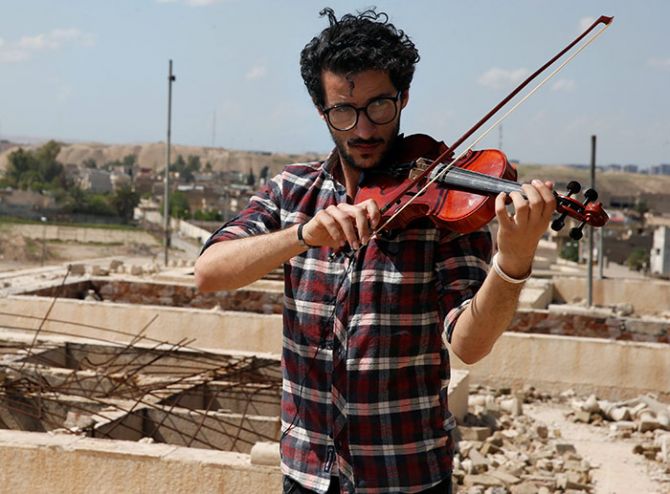
You have spoken a lot about the importance of laïcité -- the French concept of secularism and liberalism.
You are against the banning of the head scarf and hijab in France.
Do you feel that in order to make second generation Muslims feel at home in a European country and not be get radicalised, it is important not to remove their familiar customs and to not have the community Westernise or secularise too quickly?
They (the jihadis) are Westernised. These guys are born again. They cannot express the traditional version of Islam. That is why they are so strong.
Then why are you against the banning of the head scarf?
The head scarf in France is not an adaptation/manifestation of traditional Islam. The head scarf we have now is a Western form of the head scarf. It is worn by the educated, middle class segment of immigrants here.
So why hurt them, right?
The head scarf has nothing to do with the influence of the parents and grandparents. It is an innovation.
I am saying that we should be more open to visible signs of religious beliefs, because if we ban all kinds of religious attitudes, dress (etc) in the public space, we give religion to the radicals.
That is the big danger to give the keys of the religion to the radicals.
So we should accept to have visible forms of religious beliefs in the public space.
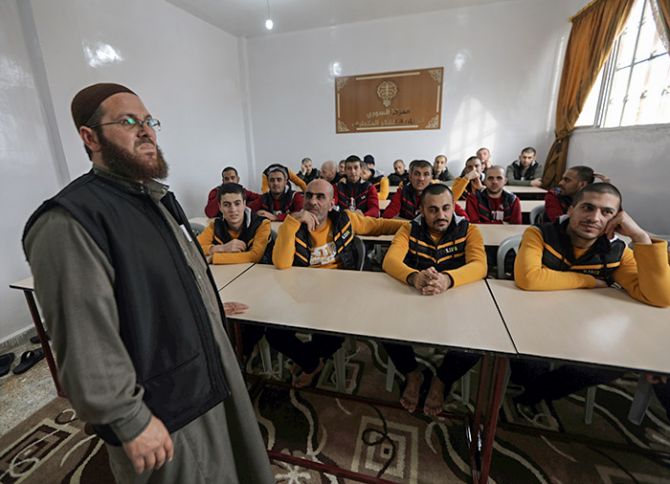
Several years ago, you said that al-Qaeda kind of attacks were going to diminish.
Could the recent number of attacks on Muslims make India a target for al-Qaeda/ISIS?
In India the Muslim community is taken hostage by the conflict between India and Pakistan.
The Muslim community in India does not (commit) terrorist attacks. Terrorism is an (import) from Pakistan.... It allows the Indian government to say they are fighting terrorism.
Terrorists do not come from the Indian Muslim community. This Indian Muslim community has legitimate grievances, especially now with the present government.
So tensions will rise. It is obvious.
The problem for the Muslim community is how to adapt its reaction in a political way. Because that is a political issue. And how to avoid being trapped in the conflict between India and Pakistan.
I am not an expert on India, so I don't know enough about the sociology of the Muslim community in India, but they have a problem of leadership clearly.
In fact, it is not a Muslim community, but a Muslim population, because the situation in Hyderabad is not the same as it is in Kashmir and so forth. It is a very fragmented community.
It is very difficult to make predictions, but it is clear that the present aggression against the Muslim population will raise tensions and might lead to some sort of non-violent reactions.
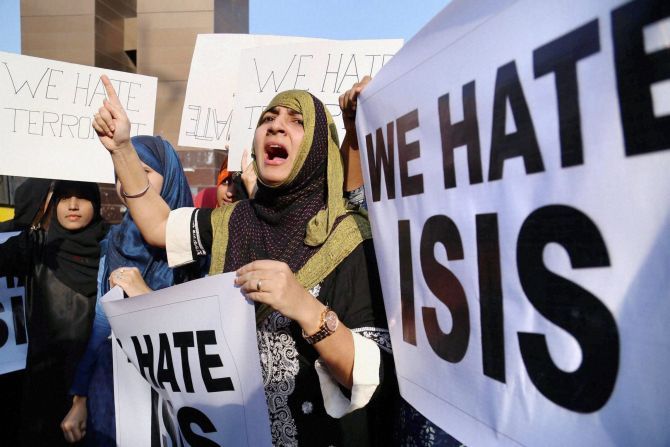
But you don't believe these events will lead to Islamic radicalisation in India.
No. No.
There are less chances of that?
You have huge political and social issues in India.
People might be (affected) by violence, but they are not (affected) by this kind of (sentiment of defending and avenging the suffering of the) global ummah of ISIS.
They have a huge ummah (of their own) in India and a huge Muslim population.
And because of that they have to take into consideration the political and social conditions of the Muslims in India.
They have to express themselves in a more political way and not through terrorism.
You have studied why youngsters from second generation Muslim families join ISIS and take to terrorism.
When it comes to white converts who join ISIS, could it be that they don't have enough of their own religion -- Christianity or whichever -- in their life that leads them to go astray.
If they were anchored better in their own faith, then perhaps they would not convert or be drawn to ISIS?
Of course, that would be what the religious authorities would say! I think it is not a problem of religion as such.
Many of these converts, I would say, 30 years ago, they would have become extreme left radicals. They would have joined the extreme left.
In the 1960s in Western Europe we had a tradition of youth radicalisation from the Marxist revolution. Suddenly around the 1990s, the dream of the Marxist revolution disappeared and al-Qaeda and ISIS filled the vacuum.
The problem here is not so much a religious issue. It is one of lack of radical alternative.
The only radical alternative now is Da'esh (Islamic State.
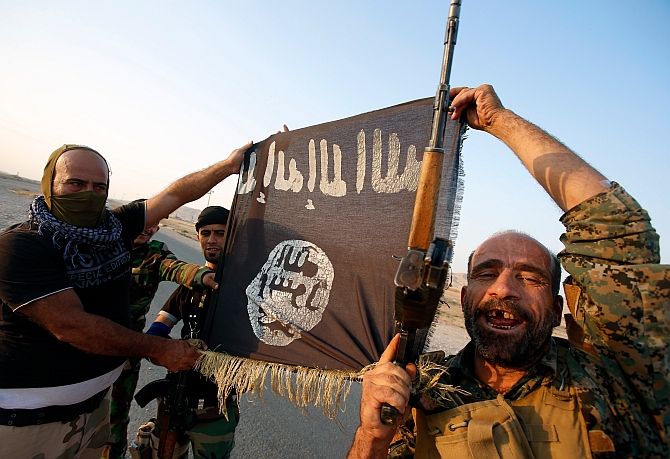
You said that these youngsters, who committed terrorist acts in Britain, Europe or America, were often outcasts from their communities and embraced ISIS, then this whole romance with dying.
Do you think they are really, really, aware of what dying is going to mean for them?
Actually, it is difficult to answer that because we cannot think the way they think.
But it is clear that they are looking for death.
In most of these terrorist attacks (they) didn't need to die. (They) could have kept explosives in a bag or organised the escape of the terrorist.
But strangely enough -- it is true from Bombay to London -- when they attacked, they all know they are going to die. They don't try to escape. And they were quite happy to die.
So, of course, when they (opt for radicalisation) they are believers. They do believe they will go to paradise... That's why I use the term apocalypse.
Except they don't believe they are going to establish a just Islamic society. They don't care with civil society. They want to die.
It is why the ISIS sermonising is so fascinating and it makes people so scared. Because there is something fascinating about this kind of Salafism.
That's why I use the term nihilistic, which is not necessarily a very good term, but the idea is that (only) death stops the project.
In coming years, you said al-Qaeda type terrorism will decrease. Have you revised your view?
Do you think homegrown terrorism will be a bigger danger all over the world?
I think homegrown terrorism might evolve.
Because if everybody dies, well, then there will be no more militants. And they don't claim reincarnation.
There will be a change now. It is not sustainable, this kind of radicalisation. It is not sustainable.
But we are not rid of this belief of the youth. We have to solve the issue of why so many youth are fascinated by death...
The fact that al-Qaeda and Da'esh might disappear doesn't solve the issue of youth radicalisation.










